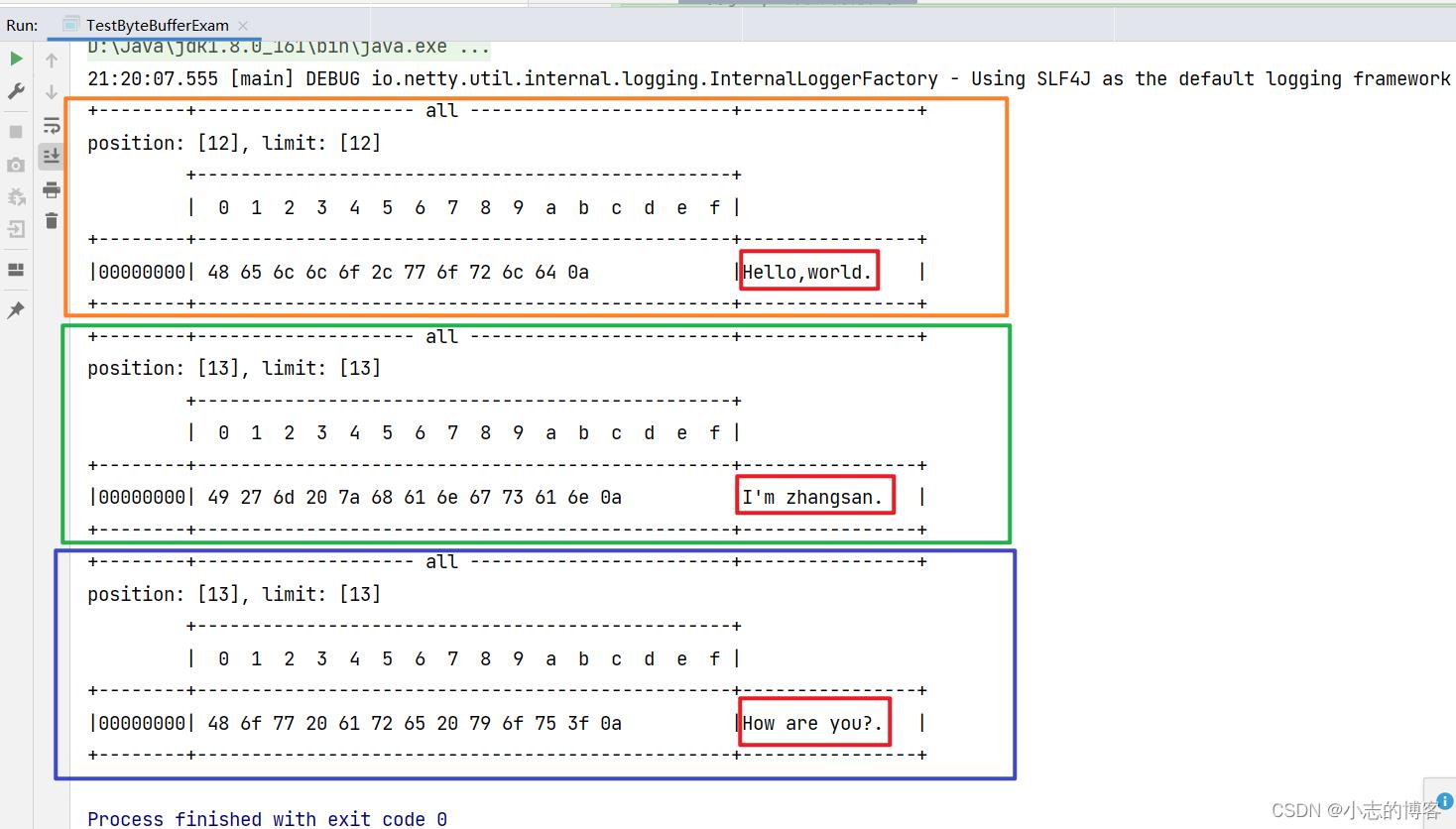Netty——ByteBuffer消息粘包半包示例
Posted 小志的博客
tags:
篇首语:本文由小常识网(cha138.com)小编为大家整理,主要介绍了Netty——ByteBuffer消息粘包半包示例相关的知识,希望对你有一定的参考价值。
目录
一、 ByteBuffer消息粘包、消息半包的概述
- NIO是面向缓冲区进行通信的,不是面向流的。既然是缓冲区,那它一定存在一个固定大小。这样一来通常会遇到两个问题:
- 消息粘包:当缓冲区足够大,由于网络不稳定种种原因,可能会有多条消息从通道读入缓冲区,此时如果无法分清数据包之间的界限,就会导致粘包问题;
- 消息半包:若消息没有接收完,缓冲区就被填满了,会导致从缓冲区取出的消息不完整,即半包的现象。
二、示例需求
网络上有多条数据发送给服务端,数据之间使用 \\n 进行分隔,但由于某种原因这些数据在接收时,被进行了重新组合,例如原始数据有3条:
- Hello,world\\n
- I’m zhangsan\\n
- How are you?\\n
变成了下面的两个 byteBuffer (黏包,半包)
- Hello,world\\nI’m zhangsan\\nHo
- w are you?\\n
现在要求你编写程序,将错乱的数据恢复成原始的按 \\n 分隔的数据
三、示例代码
-
需求代码
package com.example.nettytest.nio.day1; import java.nio.ByteBuffer; import static com.example.nettytest.nio.day1.ByteBufferUtil.debugAll; /** * @description: * @author: xz * @create: 2022-07-26 21:10 */ public class TestByteBufferExam public static void main(String[] args) //分配一个新的字节缓冲区,容量为50 ByteBuffer sourceByteBuffer = ByteBuffer.allocate(50); //写入数据 sourceByteBuffer.put("Hello,world\\nI'm zhangsan\\nHo".getBytes()); split(sourceByteBuffer); //再次写入数据 sourceByteBuffer.put("w are you?\\n".getBytes()); split(sourceByteBuffer); /** * 将错乱的数据恢复成原始的按 \\n 分隔的数据方法 * */ public static void split(ByteBuffer sourceByteBuffer) //flip 切换到读模式 sourceByteBuffer.flip(); for(int i = 0; i < sourceByteBuffer.limit(); i++) if(sourceByteBuffer.get(i) =='\\n')//找到一条完整消息 //换行符索引+1-起始位置 int length =i + 1- sourceByteBuffer.position(); // 把此条完整消息存入新的 ByteBuffer ByteBuffer targetByteBuffer = ByteBuffer.allocate(length); for(int j=0;j<length;j++) targetByteBuffer.put(sourceByteBuffer.get()); //打印byteBuffer中所有内容 debugAll(targetByteBuffer); //compact 把未读完的部分向前压缩,然后切换至写模式 sourceByteBuffer.compact(); -
输出ByteBuffer结构的工具类
package com.example.nettytest.nio.day1; import io.netty.util.internal.StringUtil; import java.nio.ByteBuffer; import static io.netty.util.internal.MathUtil.isOutOfBounds; import static io.netty.util.internal.StringUtil.NEWLINE; public class ByteBufferUtil private static final char[] BYTE2CHAR = new char[256]; private static final char[] HEXDUMP_TABLE = new char[256 * 4]; private static final String[] HEXPADDING = new String[16]; private static final String[] HEXDUMP_ROWPREFIXES = new String[65536 >>> 4]; private static final String[] BYTE2HEX = new String[256]; private static final String[] BYTEPADDING = new String[16]; static final char[] DIGITS = "0123456789abcdef".toCharArray(); for (int i = 0; i < 256; i++) HEXDUMP_TABLE[i << 1] = DIGITS[i >>> 4 & 0x0F]; HEXDUMP_TABLE[(i << 1) + 1] = DIGITS[i & 0x0F]; int i; // Generate the lookup table for hex dump paddings for (i = 0; i < HEXPADDING.length; i++) int padding = HEXPADDING.length - i; StringBuilder buf = new StringBuilder(padding * 3); for (int j = 0; j < padding; j++) buf.append(" "); HEXPADDING[i] = buf.toString(); // Generate the lookup table for the start-offset header in each row (up to 64KiB). for (i = 0; i < HEXDUMP_ROWPREFIXES.length; i++) StringBuilder buf = new StringBuilder(12); buf.append(NEWLINE); buf.append(Long.toHexString(i << 4 & 0xFFFFFFFFL | 0x100000000L)); buf.setCharAt(buf.length() - 9, '|'); buf.append('|'); HEXDUMP_ROWPREFIXES[i] = buf.toString(); // Generate the lookup table for byte-to-hex-dump conversion for (i = 0; i < BYTE2HEX.length; i++) BYTE2HEX[i] = ' ' + StringUtil.byteToHexStringPadded(i); // Generate the lookup table for byte dump paddings for (i = 0; i < BYTEPADDING.length; i++) int padding = BYTEPADDING.length - i; StringBuilder buf = new StringBuilder(padding); for (int j = 0; j < padding; j++) buf.append(' '); BYTEPADDING[i] = buf.toString(); // Generate the lookup table for byte-to-char conversion for (i = 0; i < BYTE2CHAR.length; i++) if (i <= 0x1f || i >= 0x7f) BYTE2CHAR[i] = '.'; else BYTE2CHAR[i] = (char) i; /** * 打印所有内容 * @param buffer */ public static void debugAll(ByteBuffer buffer) int oldlimit = buffer.limit(); buffer.limit(buffer.capacity()); StringBuilder origin = new StringBuilder(256); appendPrettyHexDump(origin, buffer, 0, buffer.capacity()); System.out.println("+--------+-------------------- all ------------------------+----------------+"); System.out.printf("position: [%d], limit: [%d]\\n", buffer.position(), oldlimit); System.out.println(origin); buffer.limit(oldlimit); /** * 打印可读取内容 * @param buffer */ public static void debugRead(ByteBuffer buffer) StringBuilder builder = new StringBuilder(256); appendPrettyHexDump(builder, buffer, buffer.position(), buffer.limit() - buffer.position()); System.out.println("+--------+-------------------- read -----------------------+----------------+"); System.out.printf("position: [%d], limit: [%d]\\n", buffer.position(), buffer.limit()); System.out.println(builder); public static void main(String[] args) ByteBuffer buffer = ByteBuffer.allocate(10); buffer.put(new byte[]97, 98, 99, 100); debugAll(buffer); private static void appendPrettyHexDump(StringBuilder dump, ByteBuffer buf, int offset, int length) if (isOutOfBounds(offset, length, buf.capacity())) throw new IndexOutOfBoundsException( "expected: " + "0 <= offset(" + offset + ") <= offset + length(" + length + ") <= " + "buf.capacity(" + buf.capacity() + ')'); if (length == 0) return; dump.append( " +-------------------------------------------------+" + NEWLINE + " | 0 1 2 3 4 5 6 7 8 9 a b c d e f |" + NEWLINE + "+--------+-------------------------------------------------+----------------+"); final int startIndex = offset; final int fullRows = length >>> 4; final int remainder = length & 0xF; // Dump the rows which have 16 bytes. for (int row = 0; row < fullRows; row++) int rowStartIndex = (row << 4) + startIndex; // Per-row prefix. appendHexDumpRowPrefix(dump, row, rowStartIndex); // Hex dump int rowEndIndex = rowStartIndex + 16; for (int j = rowStartIndex; j < rowEndIndex; j++) dump.append(BYTE2HEX[getUnsignedByte(buf, j)]); dump.append(" |"); // ASCII dump for (int j = rowStartIndex; j < rowEndIndex; j++) dump.append(BYTE2CHAR[getUnsignedByte(buf, j)]); dump.append('|'); // Dump the last row which has less than 16 bytes. if (remainder != 0) int rowStartIndex = (fullRows << 4) + startIndex; appendHexDumpRowPrefix(dump, fullRows, rowStartIndex); // Hex dump int rowEndIndex = rowStartIndex + remainder; for (int j = rowStartIndex; j < rowEndIndex; j++) dump.append(BYTE2HEX[getUnsignedByte(buf, j)]); dump.append(HEXPADDING[remainder]); dump.append(" |"); // Ascii dump for (int j = rowStartIndex; j < rowEndIndex; j++) dump.append(BYTE2CHAR[getUnsignedByte(buf, j)]); dump.append(BYTEPADDING[remainder]); dump.append('|'); dump.append(NEWLINE + "+--------+-------------------------------------------------+----------------+"); private static void appendHexDumpRowPrefix(StringBuilder dump, int row, int rowStartIndex) if (row < HEXDUMP_ROWPREFIXES.length) dump.append(HEXDUMP_ROWPREFIXES[row]); else dump.append(NEWLINE); dump.append(Long.toHexString(rowStartIndex & 0xFFFFFFFFL | 0x100000000L)); dump.setCharAt(dump.length() - 9, '|'); dump.append('|'); public static short getUnsignedByte(ByteBuffer buffer, int index) return (short) (buffer.get(index) & 0xFF); -
输出结果

以上是关于Netty——ByteBuffer消息粘包半包示例的主要内容,如果未能解决你的问题,请参考以下文章